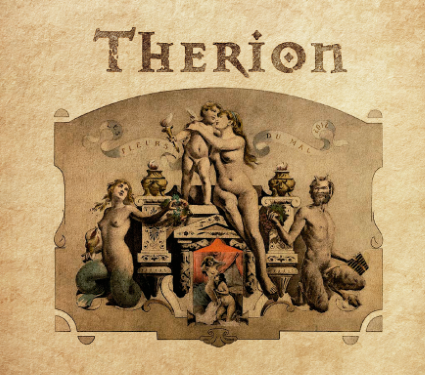
Therion - Les Fleur Du Mal
There's something to be said for bands taking grand risks. It may be comfortable to pump out album after album of songs that are slight derivations and deviations of the norm, but those can't always satisfy the creative yearning to do something daringly unique, to embrace the spirit of art in a way that popular music doesn't often accept. Not all of these endeavors turn out well, but there's something intriguing about hearing music that's completely unexpected, that turns expectations on end, and delivers an experience no one could have seen coming. It may take a certain disposition as a fan to walk into those sorts of gambits, but even if the rate of success is slight, there's that one in a million hit that comes out of nowhere and makes you question everything you thought you knew.
“Les fleur du mal” is Therion's foray into the world of music as conceptual art, a collection focused on Charles Baudelaire's famous collection of poems, “Flowers of Evil”, which was banned in France for nearly a century. If that seems an odd inspiration for an album, it certainly is. But that's part of the charm of letting the imagination run wild.
When the opening chords of “Poupée de cire, poupée de son” churn underneath operatic vocals (singing in French), you know you're getting involved in something you haven't heard before. The song cycles through the melody twice before dropping into a brief section of orchestration, which would have made more sense at the beginning of the track, setting the mood and giving the avant-garde nature of the album an introduction, rather than throwing the listener into the deep end.
“Une fleur dans le Cour” is a dramatic shift in tone, with gently plucked acoustic guitars, a somber duet, and strings underlying a classical melody that brings an element of beauty to the song that is striking. The song is still based in rock music, but has enough classical flavor to sound out of place with everything else going on, but perfectly suited to this project, and inescapably vibrant.
Vibrant may be the most applicable word to attach to the album, which has a sense of energy to it that is seldom matched. That's not the same thing as saying the music always works as a collection of songs, but the care put into crafting this album is evident, and is embodied in the shifting tones and moods. Clearly, this was not a project put together in haste, it was carefully constructed as a piece of art, doted on by a creator intent on capturing his zeitgeist.
The downside to that kind of obsessive devotion is that the results often suffer for the vision. While “Les fleur du mal” is a singular piece of music that is more art than commerce, it often falls into the category of vanity project. For every stirring melody like the one in “Polichinelle”, there's far too much that advances the cause without bringing enough musical weight to the equation. Much of the album is exposition, moving the piece from one highlight to the next, without bolstering the sagging middle.
It's a problem often found in literature, that the major events of the plot are engaging and propulsive, while the ground covered between them is mostly the purview of artistic excess and padding. That appears to be the case with this album, which taken as a whole and as a piece of art is a wondrous diversion from conventional music, but when dissected is without a heart.
The artist in me wanted to love this album, and a part of me does. It has created a new reality all its own, and when it works, the results are an absurdly inventive take on rock music that stands alone. The only issue is that it doesn't do this enough to survive as an album. As art, it is beautiful. As commerce, as I experienced it, there's still work to be done for Therion to craft the masterpiece they aimed for.

